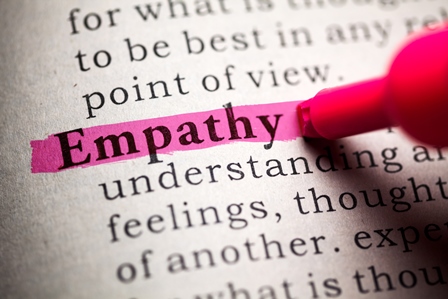Musing on Empathy and Pain

Empathy is more than compassion and caring. Empathy is putting oneself in another person’s shoes and actually feeling what that person feels.
Recently, I experienced a flare of rheumatoid arthritis with significant disabling hip pain. Deep in misery, I searched for the positive side of my suffering. I thought: “This means I will have more empathy for my patients who suffer with recurring disabling pain.”
Initially, this thought makes sense. Prevailing belief is that if someone has previous experiences similar to yours, they will be more empathetic to you. So, a prior Olympic athlete will be a better athletic coach; a prior alcoholic or drug abuser will be a better substance abuse counselor. Someone who knows the pain of cancer will empathize more closely with the suffering of a terminal cancer patient.
Obviously, though, there are exceptions. I can’t imagine the famous female Olympic gymnast coach Bela Karolyi ever having the personal experience of performing on a balance beam. Yet he was a very successful coach and I expect at times an empathetic coach. It is possible to empathize with an experience or emotion that you have not experienced. Past experience may increase empathy, but it is not guaranteed.
Sometimes, empathy can actually be an obstacle. When someone says, “I’ve been there, I know what you are feeling, let me tell you my story,” and then expounds on his or her own experience, that’s empathy to the point of self-absorption.
In the end, empathy alone doesn’t ensure understanding, much less good treatment. If you are a runner with a running injury, choosing a healthcare practitioner who also runs should not be the only criteria for your selection.
What is critical to understanding someone is not necessarily having had the same experience; it is being able to imagine what it would be like to have it. Empathy is what makes it possible for us to read each other. And it is the reason your doctor can understand your problem without actually having to live it.
My initial self-reflective thought that this flare of arthritic pain would improve my empathy with patients is not necessarily true. Empathy requires more steps.
Additional observations related to flare of rheumatoid arthritis joint pain:
- In all my years of education and training in Physical Therapy I cannot remember course work on how to become more empathetic. The reasons why are uncertain and likely multi-factorial. There is some controversy whether empathy can be taught. There is opinion it is detrimental for healthcare professionals to get too involved with their patients. There is question whether empathy actually improves medical/health outcomes.
- All rheumatoid arthritis is not the same. There are many sub-types
- There is a great deal that is unknown about arthritis
- I had a misconception regarding the helpfulness of biomarkers (blood tests). Pain can occur without elevated inflammatory blood measures
- Circadian rhythms influence levels of arthritic pain. Rheumatoid arthritis pain is worse first thing in the morning. I plan my day to get activities/work done in late afternoon.
- Be organized, clear, concise, and assertive when communicating via email with healthcare providers.
- When in pain it is important to have empathy for your significant other(s)
- It is scary.
- “Shit happens, life goes on”

For additional thoughts on personality traits that help patients manage painful health conditions see previous blog article Attributes/Values When Dealing with Chronic Medical Conditions.
Damien Howell Physical Therapy – 804-647-9499 – Fax: 866-879-8591 At-Home, At Office, At Fitness Facility – I come to you, I do home visits Damien@damienhowellpt.com
